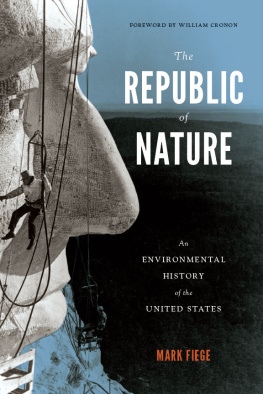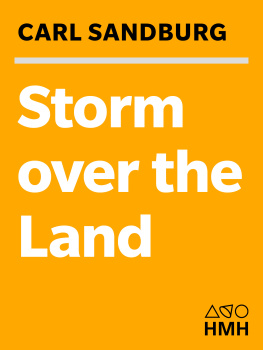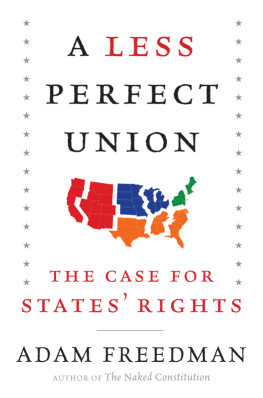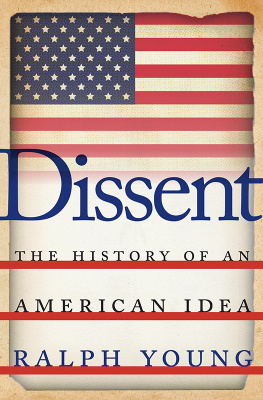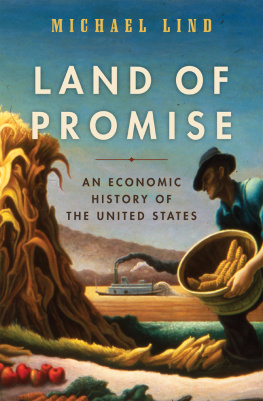WEYERHAEUSER ENVIRONMENTAL BOOKS
William Cronon, Editor
Weyerhaeuser Environmental Books explore human relationships with natural environments in all their variety and complexity. They seek to cast new light on the ways that natural systems affect human communities, the ways that people affect the environments of which they are a part, and the ways that different cultural conceptions of nature profoundly shape our sense of the world around us. A complete list of the books in the series appears at the end of this book.
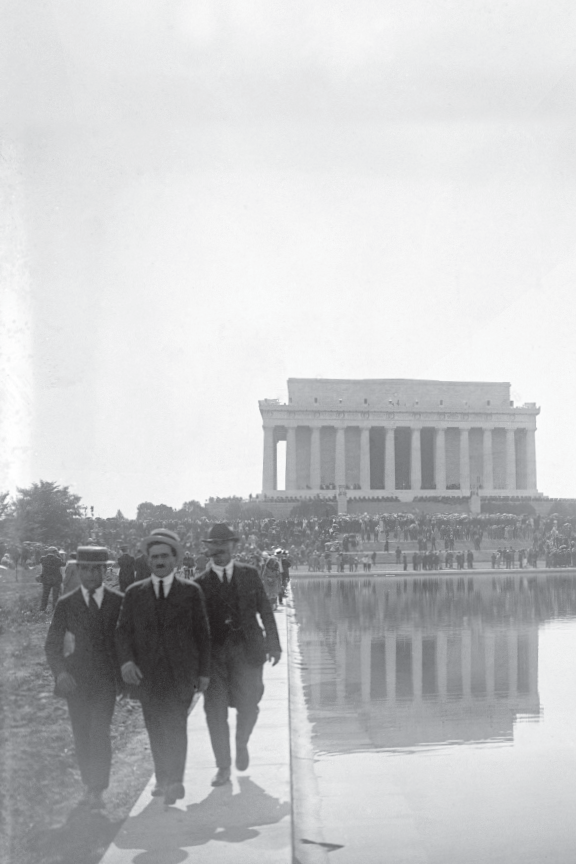
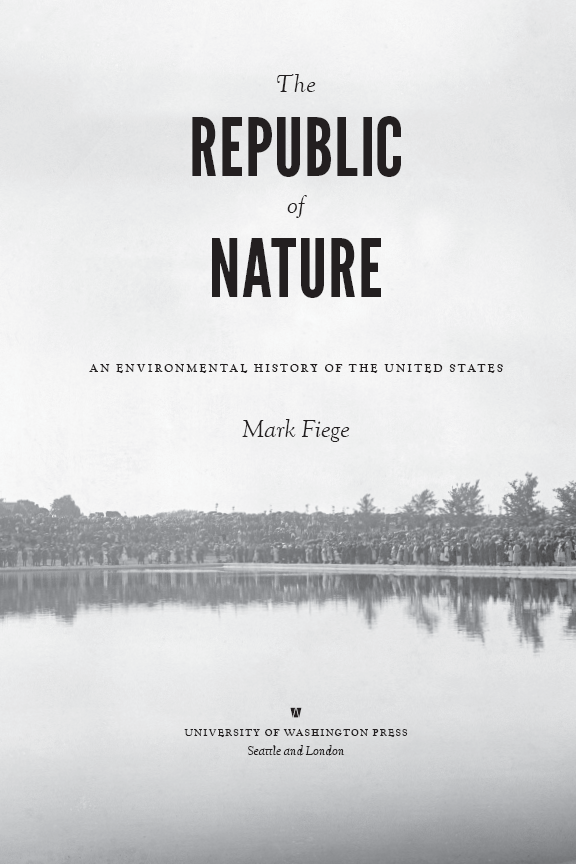
The Republic of Nature: An Environmental History of the United States is published with the assistance of a grant from the Weyerhaeuser Environmental Books Endowment, established by the Weyerhaeuser Company Foundation, members of the Weyerhaeuser family, and Janet and Jack Creighton.
2012 by the University of Washington Press
Printed and bound in the United States of America Design by Thomas Eykemans
Composed in Sorts Mill Goudy; display type set in League Gothic;
courtesy The League of Moveable Type
16 15 14 13 12 5 4 3 2 1
All rights reserved. No part of this publication may be reproduced or transmitted in any form or by any means, electronic or mechanical, including photocopy, recording, or any information storage or retrieval system, without permission in writing from the publisher.
UNIVERSITY OF WASHINGTON PRESS
PO Box 50096, Seattle, WA 98145, USA
www.washington.edu/uwpress
LIBRARY OF CONGRESS CATALOGING-IN-PUBLICATION DATA
Fiege, Mark.
The republic of nature : an environmental history of the United States / Mark Fiege.
p. cm.(Weyerhaeuser environmental books)
Includes bibliographical references and index.
ISBN 978-0-295-99167-2 (cloth : alk. paper)
1. Human ecologyUnited StatesHistory. 2. NatureEffect of human beings onUnited StatesHistory. 3. United StatesEnvironmental conditions. I. Title.
GF503F54 2012 304.20973dc23 2011035457
The paper used in this publication is acid-free and meets the minimum requirements of American National Standard for Information SciencesPermanence of Paper for Printed Library Materials, ANSI Z39.48-1984.
FRONTISPIECE Dedication of the Lincoln Memorial, May 30, 1922.
Library of Congress Prints & Photographs Division, LC-F81-19718
ISBN 978-0-295-80414-9 (electronic)
For Alexandra
Illustrations
FOREWORD
Environmental History Comes of Age
WILLIAM CRONON
Once in a great while, perhaps every decade or two for a given field, a book comes along that changes the way one thinks about an entire subject. Sometimes this happens when a writer of unusual creativity revisits a familiar topic and somehow manages to find in it insights so fresh that it's hard to believe no one noticed them before. Sometimes it happens when a scholar of unusual range wanders across a vast historiography and ties it together in an act of synthesis that discovers unexpected connections among disparate elements that few imagined might be brought together in such a surprising way. And sometimes it happens when an intellectual of unusual generosity takes the questions and findings of a specialized subfield and so compellingly demonstrates their relevance to other fields and disciplines that the subfield suddenly feels far more mainstream than one thought.
It is rare enough for a single book to succeed at one of these tasks; it is rarer still for one book to accomplish them all. And yet that is precisely what Mark Fiege's The Republic of Nature: An Environmental History of the United States does. It is surely among the most important works of environmental history published since the field was founded four or more decades ago. No book before it has so compellingly demonstrated the value of applying environmental perspectives to historical events that at first glance may seem to have little to do with nature or the environment. No one who cares about the American past can afford to ignore what Fiege has to say.
Having declared my enthusiasm so unabashedly, I should hasten to make sure that I don't misrepresent the volume you hold in your hands. Despite itssubtitle, this is not a comprehensive narrative synthesis of American environmental history. Squeezing such a vast subject between the covers of a single book is such a daunting task that few scholars have even attempted it. (The best is Ted Steinberg's Down to Earth: Nature's Role in American History, first published in 2002, which can now be supplemented with the superb historiographical essays gathered in Douglas Sackman's A Companion to American Environmental History, published in 2010.) Mark Fiege chose for himself quite a different task when he embarked on this project more than a decade ago. Fearing that an encyclopedic account might fall victim to the familiar textbook problem of too much obligatory information trading depth for breadth and thereby undermining storytelling and analysis alike, he chose instead to concentrate on a few carefully chosen but far-flung episodes. Rather than try to synthesize everything that he and his colleagues had learned over the past half century about American environmental history, his goal would be to illustrate by example the kinds of questions and interpretive insights that have become central to the field.
Fiege's real stroke of genius lay in the way he selected episodes to demonstrate the value of an environmental historical perspective for scholars, students, and other readers unfamiliar with the field. As a committed undergraduate teacher, he wanted to write a book that could be used in U.S. history survey courses, where he knew full well that most high school and college teachers must necessarily rely on a standard textbook to guide their students through the vast terrain of the American past. A parallel environmental history textbook with a similar table of contents would have little chance of being adopted in such classrooms, and might even feel repetitious if it were. At the same time, Fiege wanted to write a book that would convey to nonacademic readers the ways environmental history can alter our sense of the past by encouraging us to see familiar events from radically different points of view.
The solution he hit upon was to identify historical episodes that were so utterly familiar that every high school and college teacher was bound to include them in a U.S. history syllabus and every reader would recognize them. Then he applied a more daring and surprising criterion. He decided to seek out classic episodes in American history that are rarely if ever viewed in environmental terms so he could then reinterpret them through the lens of environmental history. Revisiting and rewriting the most familiar of histories to make them seem unexpectedly unfamiliar: this was the high bar Fiege set for himself.
If my own description of the book suddenly feels less abstractly academicand more genuinely intriguing, then you've got a sense of why I was so excited when Mark Fiege first described this project to me. Just let your mind wander a bit: what would be on your own list of classic moments in the American past that are usually discussed as if they had no connection to the natural world? It's a fascinating question, and Fiege ranged far and wide in his efforts to answer it. As he did so, though, he began to realize that writing this book would be a good deal harder than he first thought. Much of the initial excitement that the field of environmental history generated arose from the fact that it studied topics that had been largely ignored by other historians: the impact of epidemic diseases on Amerindian populations; the unrecognized ways that native peoples had used fire to alter landscapes; the consequences of introducing non-native species to North American ecosystems; the effects on soils of cutting down forests and planting agricultural crops in their stead; the harnessing of rivers in the name of progress; the role of national parks in expressing American ideas of nature and nationhood; and so on and on. These and many other subjects were hardly central to American historical scholarship when environmental history began to emerge in the 1960s and 1970s. Few textbooks made more than a passing reference to any of them, so demonstrating their importance was a big part of what made the field feel new.

